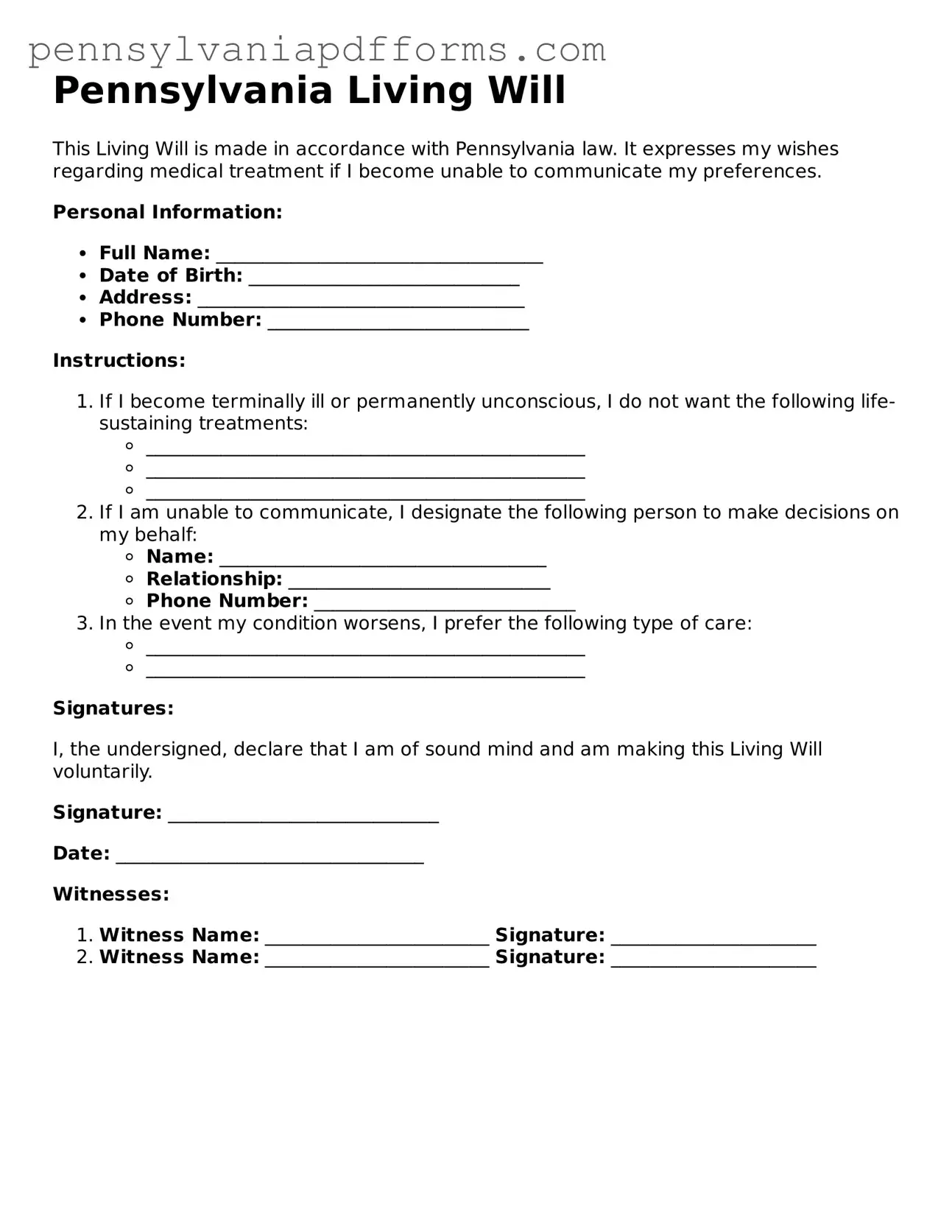The Pennsylvania Living Will form is similar to the Advance Directive, which encompasses both a living will and a durable power of attorney for healthcare. Like the living will, the Advance Directive allows individuals to express their wishes regarding medical treatment in the event they become unable to communicate. This document provides a comprehensive approach, ensuring that both specific treatment preferences and the designation of a healthcare proxy are clearly outlined.
Another comparable document is the Durable Power of Attorney for Healthcare. This form specifically designates a trusted individual to make healthcare decisions on behalf of the individual if they are incapacitated. While the living will focuses on treatment preferences, the Durable Power of Attorney empowers someone to interpret and act on those wishes, providing a clear line of authority in critical situations.
The Do Not Resuscitate (DNR) order is also similar in purpose, as it communicates a person's desire not to receive cardiopulmonary resuscitation in case of cardiac arrest. This document is more specific than a living will, focusing solely on the resuscitation aspect. It ensures that medical personnel respect the individual's wishes in emergency situations, aligning closely with the intent of a living will.
The Physician Orders for Life-Sustaining Treatment (POLST) form shares similarities with the living will by providing specific medical orders based on the patient's preferences. Unlike a living will, which may be more general, the POLST is a medical order signed by a physician that translates the patient’s wishes into actionable medical orders, making it a vital tool for those with serious illnesses.
The Health Care Proxy form is another document that parallels the living will. This form allows individuals to appoint someone to make healthcare decisions on their behalf. While the living will outlines preferences for treatment, the Health Care Proxy ensures that a designated person can interpret and enforce those preferences, thus bridging the gap between wishes and action.
When considering the complexities of lease agreements, it's essential to familiarize yourself with a variety of related documents, akin to how the Ohio Lease Agreement form functions in establishing rental terms. This comprehensive understanding not only facilitates smoother transactions but also aids in recognizing other important resources, such as the PDF Document Service, which can provide valuable templates and guides for drafting these crucial documents.
State-specific advance directives, such as those in California or New York, are also similar to the Pennsylvania Living Will. These documents serve the same purpose of detailing an individual's healthcare preferences and appointing decision-makers. The primary difference lies in the specific legal requirements and language used in each state, but the underlying intent remains consistent across jurisdictions.
The Medical Power of Attorney (MPOA) is akin to the Durable Power of Attorney for Healthcare. This document grants authority to a designated individual to make healthcare decisions when the person is unable to do so. Like the living will, it emphasizes the importance of having someone advocate for the individual's healthcare preferences, ensuring that their wishes are respected.
The Five Wishes document is another relevant form. It combines elements of a living will and a healthcare proxy, addressing not only medical treatment preferences but also emotional and spiritual needs. This comprehensive approach allows individuals to express their desires in a more holistic manner, ensuring that their values and beliefs are honored alongside their medical choices.
The Advance Care Plan is similar in that it encourages individuals to discuss and document their healthcare preferences with family and medical providers. This document goes beyond the legal aspects of a living will by fostering open communication, which can lead to more personalized care that aligns with the individual's values and wishes.
Lastly, the End-of-Life Care Plan shares commonalities with the living will by focusing on the individual's preferences for end-of-life care. This document helps guide family members and healthcare providers in making decisions that reflect the individual's desires, ensuring that their final wishes are honored during critical moments.

